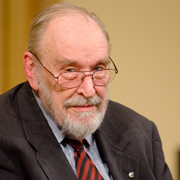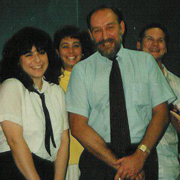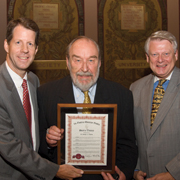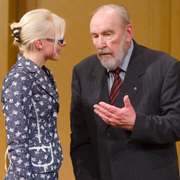It is with great sadness that we inform you that longtime TFAS friend and faculty member, Professor George Viksnins, passed away on Dec. 16, 2012. Viksnins was retired from a distinguished career on the faculty of Georgetown University.

Viksnins was a long-time academic director of ICPES and taught comparative economic systems in the program from 1973 until very recently, when he instead delivered a guest lecture each summer on the ideas of his favorite economist Joseph Schumpeter. Viksnins liked to walk students through Schumpeter’s analysis that, despite the superiority of capitalism over socialism, it was likely that capitalism would not survive due to hostility from the intellectual community. Viksnins was a bit more sanguine about things, noting that when he first gave his lecture in the late 1970s, he thought Schumpeter was right. But he told students more recently: “Progress is possible. The question ‘Can capitalism survive?’ will be answered by you and your generation.”
Reflecting on the mission of ICPES, Viksnins once wrote: “The founders (of ICPES) realized that the superiority of the free-market system and the American political system would be evident in the longer run. In the meantime, disinformation about these matters needed to be confronted by truthful, objective and challenging courses, such as the upper-division courses in economics and government provided in the ICPES program.”
He also taught in TFAS programs in Prague and Hong Kong. Even after his retirement, Viksnins attended the annual student barbecue in Washington each summer and enjoyed meeting students, particularly those from the Baltic countries. Viksnins was an advisor to his native Latvia after the fall of communism and is credited with playing an important role in the design of the Latvian monetary system. There is a video presentation by him in the visitor’s center of the Bank of Latvia.

President Roger Ream (ICPES 76) spoke with Viksnins a few days before he passed away. Viksnins called to say he would miss the annual TFAS Christmas dinner due to his health issues. “George and I talked about meeting for lunch soon, so we could reflect on the state of the world,” said Ream. “He had strong opinions, most gleaned from his close observation of the world and the economic way of thinking he developed by studying Schumpeter, Milton Friedman and other great economists. His passion for teaching was unsurpassed.”
“George was the standard we used for selecting professors to teach in TFAS programs,” added Chairman Randy Teague. “Students for several generations commented that he was the best professor they had in their four years of college study. His influence will continue in this world for years to come, and we will live with his teachings throughout our lives.”
More than 3,000 students took the course on comparative economic systems that Viksnins taught each summer through TFAS. The man they came to call Uncle George greeted them each morning with, “A gracious good morning.” All who had the opportunity to call him their teacher or friend will miss Viksnins. His death leaves quite a wake, as the lives he touched were many and his influence was worldwide.
TFAS professor and alumnus Gary Armstrong (ICPES 84) recounted his experience as a student in Viksnins’ class: “Every morning at the end of his lectures, he would ask, ‘are there any questions or objections?’ And what happened was simply stunning. The class came alive. Students began to realize that it wasn’t just about shifting curves in Professor Viksnins’ class. Suddenly gigantic debates about human creativity, human freedom and human nature were taking place in a class in economics.”

Viksnins earned a bachelor’s degree in economics (distinction) from Temple University (1959); a master’s degree in economics from the University of Pennsylvania (1960) and a Ph.D. from Georgetown University (1964). He was a professor of economics at Georgetown, where he served on the faculty since 1964. He was program economist for the USAID Mission in Bangkok from 1968-1970 and visiting professor at the University of California (Irvine) from 1986-1987. He served as a consultant to the Board of Governors of the Federal Reserve System, The World Bank and the International Monetary Fund.
In 2002, TFAS awarded Viksnins the annual Walter Judd Freedom Award in recognition of his commitment to the preservation of freedom and lifelong opposition to tyranny. It was an honor that Viksnins genuinely appreciated. His portrait, which was unveiled at that award dinner, hangs in TFAS Headquarters. In 2004, Viksnins was recognized with the Order of the Three Stars, the highest state honor in Latvia. The motto for that award is per aspera ad astra, meaning to the stars through difficulty, which perhaps captured the life Viksnins led as a determined professor challenging his students to think.

On the occasion of Viksnins’ retirement from Georgetown, TFAS held a dinner in celebration of his career. With his encouragement, we established the George Viksnins Scholarship Fund to help deserving students attend TFAS programs, with particular attention to those from the Baltic and other former communist dominated countries. George and his wife Mara recently celebrated their 50th wedding anniversary, and they asked guests at their celebration to make contributions to the George Viksnins Scholarship Fund in lieu of gifts.
TFAS will continue George’s legacy in the future. Please visit www.TFAS.org/ViksninsFund to donate to his scholarship fund.
The Fund for American Studies offers its deepest sympathy to Mara Viksnins and their children and grandchildren.
RELATED LINKS:

